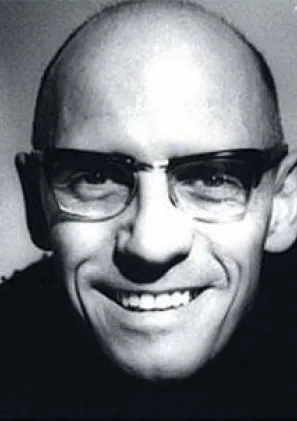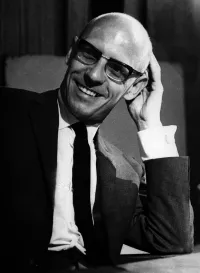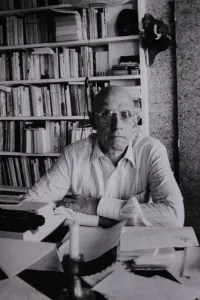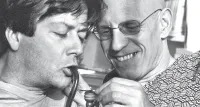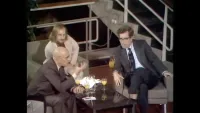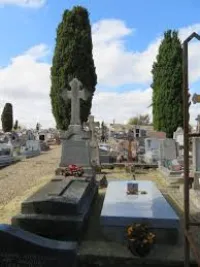Biography
1926 - 1984
"Power is not an institution, and not a structure; neither is it a certain strength we are endowed with; it is the name that one attributes to a complex strategical situation in a particular society."
- Michel Foucault
Michel Foucault, who refused to be put into any one category, maintained that “The main interest in life and work is to become someone else that you were not at the beginning.” Undeniably one of the most influential intellectuals of his time, in 1970 he became chairman of the History of Systems and Thought at the Collège de France. His writings and critical studies have had enormous impact on disciplines such as psychoanalysis, history, philosophy, medicine, linguistics, prison systems, and the human sciences. Foucault examined the codes and concepts by which societies operate and define themselves – especially the "principles of exclusion" such as the distinctions between sane/insane or gay/straight. By studying these social attitudes in relation to institutions (asylums, hospitals, prisons) he theorized that one could trace the development of power. Thus, there was no one history – only the recorded history of supremacy. His books included Madness and Civilization (1961) which charted western society’s attitudes toward the insane, The Order of Things (1966), The Archaeology of Knowledge (1969) – a methodological response to his critics, and Discipline and Punish (1975) which explored the rise of penal institutions. His 3 volume History of Sexuality (An Introduction, The Uses of Pleasure, and The Care of the Self - 1976 -1984, collectively) explored the relation between morality and sexuality. It was also among the first works to view homosexuality in a societal context. In 1960 he met philosopher David Defert who would become his life-partner of 20 years. An outspoken homosexual, Foucault died of complications from HIV in 1984.
1926 - 1984
"Power is not an institution, and not a structure; neither is it a certain strength we are endowed with; it is the name that one attributes to a complex strategical situation in a particular society."
- Michel Foucault
Michel Foucault, who refused to be put into any one category, maintained that “The main interest in life and work is to become someone else that you were not at the beginning.” Undeniably one of the most influential intellectuals of his time, in 1970 he became chairman of the History of Systems and Thought at the Collège de France. His writings and critical studies have had enormous impact on disciplines such as psychoanalysis, history, philosophy, medicine, linguistics, prison systems, and the human sciences. Foucault examined the codes and concepts by which societies operate and define themselves – especially the "principles of exclusion" such as the distinctions between sane/insane or gay/straight. By studying these social attitudes in relation to institutions (asylums, hospitals, prisons) he theorized that one could trace the development of power. Thus, there was no one history – only the recorded history of supremacy. His books included Madness and Civilization (1961) which charted western society’s attitudes toward the insane, The Order of Things (1966), The Archaeology of Knowledge (1969) – a methodological response to his critics, and Discipline and Punish (1975) which explored the rise of penal institutions. His 3 volume History of Sexuality (An Introduction, The Uses of Pleasure, and The Care of the Self - 1976 -1984, collectively) explored the relation between morality and sexuality. It was also among the first works to view homosexuality in a societal context. In 1960 he met philosopher David Defert who would become his life-partner of 20 years. An outspoken homosexual, Foucault died of complications from HIV in 1984.
Demography
Demography
Gender Male
Sexual Orientation Gay
Gender Identity Cisgender
Ethnicity Caucasian/White
Faith Construct Atheist
Nations Affiliated France Sweden Poland Germany United States
Era/Epoch AIDS Era (1980-present)
Field(s) of Contribution
Academics
Author
Education
Humanities
Philosophy
Social Justice
Demography
Gender Male
Sexual Orientation Gay
Gender Identity Cisgender
Ethnicity Caucasian/White
Faith Construct Atheist
Nations Affiliated France Sweden Poland Germany United States
Era/Epoch AIDS Era (1980-present)
Field(s) of Contribution
Academics
Author
Education
Humanities
Philosophy
Social Justice
Resources
Resources
Butler, Judith. Gender Trouble: Feminism and the Subversion of Identity. New York: Routledge, 1990.
Dollimore, Jonathan. Sexual Dissidence: Augustine to Wilde, Freud to Foucault. New York: Oxford University Press, 1991.
Eribon, Didier. Michel Foucault. Trans. Betsy Wing. Cambridge, Mass.: Harvard University Press, 1991.
Halperin, David. Saint Foucault: Towards a Gay Hagiography. New York: Oxford University Press, 1995.
Miller, James. The Passion of Michel Foucault. New York: Simon & Schuster, 1993.
Sedgwick, Eve Kosofsky. Epistemology of the Closet. Berkeley: University of California Press, 1990.
Spargo, Tamsin. Foucault and Queer Theory. Cambridge: Cambridge University Press, 1999.
http://en.wikipedia.org/wiki/Michel_Foucault
https://www.nytimes.com/1984/06/26/obituaries/michel-foucault-french-historian.html
Resources
Butler, Judith. Gender Trouble: Feminism and the Subversion of Identity. New York: Routledge, 1990.
Dollimore, Jonathan. Sexual Dissidence: Augustine to Wilde, Freud to Foucault. New York: Oxford University Press, 1991.
Eribon, Didier. Michel Foucault. Trans. Betsy Wing. Cambridge, Mass.: Harvard University Press, 1991.
Halperin, David. Saint Foucault: Towards a Gay Hagiography. New York: Oxford University Press, 1995.
Miller, James. The Passion of Michel Foucault. New York: Simon & Schuster, 1993.
Sedgwick, Eve Kosofsky. Epistemology of the Closet. Berkeley: University of California Press, 1990.
Spargo, Tamsin. Foucault and Queer Theory. Cambridge: Cambridge University Press, 1999.
http://en.wikipedia.org/wiki/Michel_Foucault
https://www.nytimes.com/1984/06/26/obituaries/michel-foucault-french-historian.html
